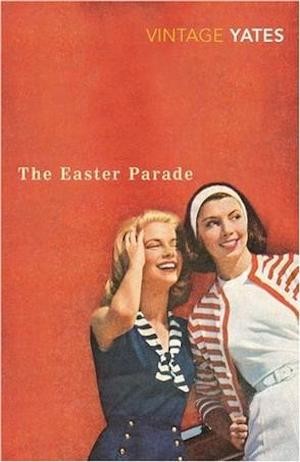After reading a few contemporary duds, I’ve taken refuge in the haven of mid-20th century American literature and read The Easter Parade by Richard Yates. I adore literature from this era for it’s well-edited, unpretentious yet profound writing and I haven’t been disappointed this time either. We’re in 1930’s New York. Sarah and Emily are sisters and the children of divorced parents Pookie and Walter Grimes. The opening sentence sets the stage: ‘Neither of the Grimes sisters would have a happy life, and looking back it always seemed that the trouble began with their parents’ divorce.’ Expect no happy ending.
Sarah is the prettier and outgoing of the two while Emily is serious and smarter. Growing up, their reality is ruled by Pookie’s lofty dreams and social aspirations, moving from place to place while their mother looks for better opportunities. Walter is loving but distant and struggles with drinking, a trap that pretty much everyone in this novel falls into at some point (Richard Yates’s own life was seeped in alcohol).
Emily and Sarah choose very different paths in life. Sarah marries early, has three boys in quick succession and aspires to very little. Emily attends university, has a career as an advertising copywriter but struggles to find a life partner. Sarah’s marriage begins to falter, Emily’s boyfriends turn out to be mean or gay or both, the sisters desperately need each other and occasionally reach out but nothing ever comes of it. Communication fails. Missed opportunities abound.
Yates’ writing is superb, simple but multi-layered and a clever combination of funny and melancholic. It reminds me of some favourites (also reviewed on Bookstoker) from the same period: Wallace Stegner’s Crossing to Safety and Evan S. Connell’s Mrs Bridge. I love Yates’ ability to capture, in a sentence or two, an entire personality.
Esther Grimes, or Pookie, was a small, active woman whose life seemed pledged to achieving and sustaining and elusive quality she called ‘flair’. She pored over fashion magazines, dressed tastefully and tried many ways of fixing her hair, but her eyes remained bewildered and she never quite learned to keep her lipstick within the borders of her mouth, which gave her an air of dazed and vulnerable uncertainty.
Yates hints and alludes and says without saying, mirroring the characters in the novel who almost without exception fails to be honest or tell the truth, even about the most elementary things. Such as when Emily learns that her father is not a college graduate.
‘You mean you thought I was a college graduate? Where’d you get that idea? Your mother?’
‘I guess so, yes.’
‘Well, your mother has her own way of dealing with information.’
Yates’ novel is a product of its time and his preoccupation with domestic fulfilment as the chief goal of both sisters might grate with some of you. I loved it, though, for the way Yates portrays family dysfunction and failure of communication. The many missed opportunities, the striving to be something other than what you are and pretending to be someone else all adds up to a potent reminder of how to NOT live your life.
The Easter Parade by Richard Yates is published by Vintage Books, 226 pages.





